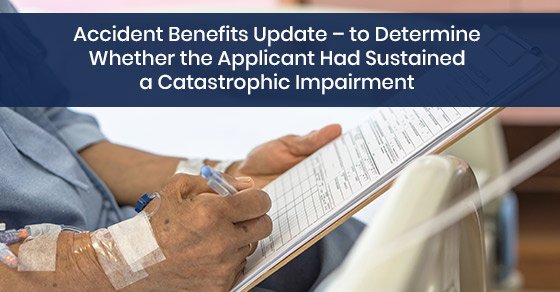Accident Benefits Update - to Determine Whether the Applicant Had Sustained a Catastrophic Impairment

Applicant v. Toronto Transit Commission (2019 CanLII 101715) was a recent proceeding before the Licence Appeal Tribunal (LAT) to determine whether the unnamed Applicant had sustained a catastrophic impairment (catastrophic) as a result of injuries he sustained after being struck by a streetcar while crossing as a pedestrian.
The Applicant sustained physical Injuries including a traumatic brain injury and continued to suffer from psychological, cognitive and behavioural impairments including depression, anxiety, poor impulse control, concentration and sleep deficits. He claimed that he was catastrophic based on Category 8 - Mental and Behavioural Disorders.
Prior to the recent amendments to the Statutory Accident Benefits Schedule (SABS), in order to be deemed catastrophic under Category 8, an Applicant had to demonstrate that he suffered a Class 4 (Marked) impairment in one of 4 domains of functioning: Activities of Daily Living, Adaptation, Concentration, Persistence and Pace, or Social Functioning. A Marked impairment is defined as one that "significantly impedes useful functioning"; a Class 3 (Moderate) impairment is one that is "compatible with some, but not all, useful functioning", and will not qualify as catastrophic.
The Applicant claimed that he had suffered a Marked impairment in the domain of Adaptation (a person’s ability to adapt to stressful circumstances). Before the collision, he had achieved notoriety as a chef, including two appearances on a popular celebrity cooking show, despite a history of substance abuse, erratic behaviour resulting in a criminal record, and inconsistent employment history. He described himself as rising above these issues on a path for ongoing success, until the collision that "robbed him of his ability to smell and taste and left him with sleep issues, persistent headaches, a raw temper, thoughts of suicide and a broken, care-giver-like marital arrangement".In contrast, the TTC argued that his ongoing adaptation issues were generally consistent with his pre-accident behaviour, and that the collision did not cause significant additional impairment. Adjudicator Boyce found the Applicant to be a poor and potentially self-serving historian; however, she observed that as with most cases, the "truth" of his condition likely fell somewhere between the extremes described by the parties.
The Applicant’s position was strongly supported by an expert report and oral evidence provided by Dr. Davidson, a Neuropsychologist. She identified the objective evidence of the Applicant’s brain injury through neuroimaging, and corelated it to other evidence of his deteriorating function and ongoing impairment. She was especially clear on the role played by his pre-history, explaining that these issues enhanced his vulnerability but did not account for his post-collision adaptive dysfunction. She also emphasized that, during testing, the Applicant’s met all expected validity measures, which indicated he was provided consistent and reliable effort.
Neurologically, Dr. Davidson diagnosed the Applicant with an unspecified cognitive disorder and mild neurocognitive disorder, both due to a traumatic brain injury. Psychologically, she diagnosed a major depressive disorder, moderate somatic symptom disorder with pain and a pain disorder associated with psychological factors and medical condition. Several of the Applicant’s other physicians agreed with these diagnoses. As result of these impairments, the evidence confirmed that he was unable to function at work and had great difficulty in social situations more generally.
The TTC provided a responding catastrophic report from Dr. Lawson, a Neuropsychologist. However, it did not call Dr. Lawson at the hearing, preferring to rely upon an earlier report (and oral evidence) by Dr. Dowhaniuk. Presumably, the TTC viewed the Dowhaniuk report as a stronger counter-position. However, as her had not made any commentary on catastrophic or Category 8 impairment, Adjudicator Boyce accorded little weight to his evidence.
The TTC also submitted a report by its catastrophic Psychiatric expert Dr. Debow but did not to call him to provide evidence. Again, the adjudicator gave little weight to this report, which had identified the Applicant’s impairments as Mild in all 4 domains.
Based on the strength of the Davidson report and the wealth of corroborating evidence provided by the Applicant, Adjudicator Boyce accepted that he had suffered catastrophic impairment in Adaptation as a result of the collision.
This decision highlights the importance of identifying the right experts and the value for an Applicant of providing consistent effort in testing. If you have suffered a traumatic brain injury or other ongoing impairment after a collision and have questions regarding catastrophic or your entitlement to accident benefits, we are pleased to offer a free consultation. Put Campisi LLP to work for you - Clients First, Excellence Always!
Subscribe to our newsletter
Get free insights delivered right to your inbox
Give us your email address and we’ll send you the latest information on updates to the legal and insurance system and learn how you can make the best recovery possible.
.jpg?width=726&height=440&name=image%2013%20(1).jpg)
Recent Posts
Put our expertise to work for you.
If you or a loved one has been seriously injured, you need a personal injury lawyer who puts client care first and who also knows how to navigate the complex legal system.
Contact Us Now